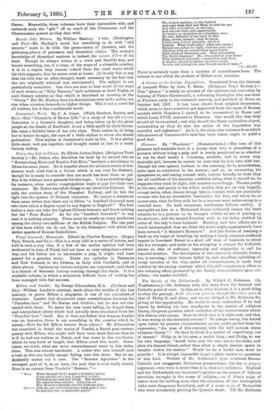century, to prove Milton a plagiarist, is one of the
curiosities of literature. Lander had discovered some resemblances between the "Paradise Lost" and Du Bartaa and Grotius ; but he was not con- tented with these. To make his case more telling, he forged lines, and interpolated others which had actually been translated from the "Paradise Lost" itself. But it does not follow that because Lander was an impostor, there is not something in the question which he raised,—How far did Milton borrow from others ? Mr. Edmondson has examined in detail the works of Vondel, a Dutch poet contem- porary with Milton, who might well have been more famous than he is if he had not written in Dutch, and has come to the conclusion, which he sets forth at length, that Milton owed him much. Some- times, we think, what are mere remembrances seem to him imita- tions. This was almost inevitable. A writer who sets himself such a task as this can hardly escape falling into this error. But he un- doubtedly makes out a case. The "Samson Agonistes" is the strongest part of it, or, at least, the part that is most easily stated. Here is an extract from Vondel's "Samson :"— " Sam. When through God's power a fountain sprang From out the ass's jaw, I. parched in fight, Refreshed toy soul and drank. The wondrous fount My anguish thus allayed. Upon you all May Heaven's blessing rest for kindness done. Chorus. Samson, our valorous prince, what pain is ours To find you thus in miserable plight !
We, Jewish maidens, to this festival
Are come from East and West, to seek for you
And offer consolation, as the time.
And not our wish, give opportunity. No brute's so shameless as a thankless man.
We owe, defender of our land, to thee Help, service, honour ; that we know. 0 bear your sorrow patiently, till God Dispose. What heart-ache! what sore agony I Though sun refuse his light, God can your soul Illumine with an inward flame more bright Than sheen of thousand suns. Who can confine The Might Supreme ? He, who endowed your frame With wondrous strength, concealed in your hair, Is mighty, should he please, in you to work, To arm and strengthen you, though shorn of looks." 211-MO.
There is certainly more than a number of coincidences here. The volume is one which the student of Milton must examine.














































 Previous page
Previous page